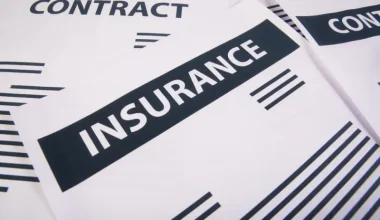Insuring a small business helps safeguard its property, income, and assets from calamities. Even a brand-new small business needs insurance to protect its assets. All businesses, no matter how small, must have certain types of insurance, such as workers’ compensation, while other types of insurance are not required but are still highly recommended. Your business will be safe from financial ruin in the event of an accident, a lawsuit, or a natural disaster if you invest in insurance. In this article, we will discuss how much small business insurance costs, how small business insurance works, and the cost per month.
What Is Small Business Insurance and How Does It Work?
Small business insurance refers to a variety of insurance policies designed to protect small businesses from financial losses. These policies typically cover a range of risks that small businesses face, such as property damage, liability, theft, and employee-related risks. One common type of small business insurance is general liability insurance, which protects businesses from claims related to bodily injuries, property damage, and advertising mistakes. Property insurance covers physical assets like buildings, equipment, and inventory against damage or theft.
Professional liability insurance, also known as errors and omissions insurance, is crucial for service-based businesses, protecting them from claims of negligence or inadequate work. Workers’ compensation insurance covers medical expenses and lost wages for employees who are injured on the job. Additionally, business interruption insurance helps businesses recover lost income and cover expenses if they are forced to shut down temporarily due to a covered disaster.
Small business owners can customize their insurance coverage based on their specific needs and industry requirements, providing them with peace of mind and financial protection in case of unforeseen events.
What Is Considered a Small Business?
A small business is defined by the U.S. Small Business Administration (SBA) as a privately owned company with less than 500 employees. However, this meaning can shift depending on the sector.
According to the III, only small and medium-sized businesses that meet specific criteria can obtain a BOP policy. There are a number of criteria that insurers may use to determine if a company qualifies for a BOP.
#1. Number of Employees
When determining whether or not a business is considered small, the number of employees is often taken into account. In general, companies with fewer than a particular number of workers are categorized as “small.” The insurance company sets the minimum number of covered employees, which can be anywhere from a handful to several hundred, depending on the nature of the business and the policy in question.
#2. Pattern of Ownership
The SBA also considers the business’s ownership structure when determining whether or not a company is considered small. Insurance providers may look at a number of factors, including whether or not the business is privately held or a subsidiary of a larger conglomerate.
Furthermore, it is important to evaluate your plans and talk with your insurance providers to be sure you fulfill the exact requirements for coverage, as the definition of a small business may vary among insurance companies.
#3. Annual Revenue
When deciding a company’s size, the SBA takes into account both the number of employees and the revenue generated each year. In a similar vein, some insurance companies will only cover firms up to a certain annual revenue level.
#4. Categorization of Businesses
The definition of a small business might vary widely from one industry to the next. The SBA, for instance, establishes sector-specific minimum employment and revenue thresholds. Eligibility for government grants and contracts can be established using these criteria.
How Many Employees is the Max for a Small Business?
There isn’t a specific number of employees that universally defines a small business. Small business classifications can vary based on the country, industry, and regulatory context. In the United States, for example, the Small Business Administration (SBA) defines a small business based on industry standards, which may include criteria such as average annual receipts or number of employees.
For instance, in manufacturing, a small business is generally considered one with 500 or fewer employees, while in the service industry, the threshold might be much lower, around $7.5 million in average annual receipts for many businesses.
It’s important to check the specific regulations and definitions relevant to your industry and location. These classifications can impact various aspects of your business, including tax rates, regulatory requirements, and access to certain government programs and contracts.
What Does a Small Business Insurance Policy Cover?
A small business insurance policy can shield your company against financial losses, property damage, and more, depending on the coverage you select. Theft, fire, wind, collapsed things, and even lightning might all be covered events. You should read your insurance policy thoroughly to understand what is and is not covered.
Also, each component of your BOP, like other types of insurance, has its own maximum payout. The most your insurance company will pay out in the event of a claim falls under this category. There may be a deductible associated with your coverage. Your insurance policy will only pay for covered expenses after you’ve met your deductible.
#1. General Liability Coverage
General liability coverage (sometimes known as commercial general liability or CGL) is a standard component of most BOPs. If the company is found liable for a customer’s injuries or property damage caused by an employee, the insurance will help pay for those losses. In the event of a lawsuit resulting from an employee injury at work, it might also be useful for paying legal fees.
The same holds true for commercial general liability insurance limits. This implies that if an injured party’s medical costs exceed the limit of your insurance policy, you might be liable for the balance.
#2. Commercial Auto Insurance
If you or your employees use private cars for company business, you should investigate whether commercial auto insurance is something you need to protect your vehicles, the tools, equipment, and other cargo they carry, and the people who use those vehicles to provide daily service to your company. Vehicles used in company operations present unique risks that can be mitigated with commercial auto insurance. All passenger and light commercial vehicles, such as pickup trucks and vans, are included.
Because automobiles used for business reasons are subject to a particular type of risk and because many commercial uses are specifically excluded from standard auto insurance plans, commercial auto insurance is crucial. Get in touch with your insurance provider and let them know if you or your staff use any vehicles (company or personal) for client meetings, errands, moving equipment, or getting from one location to another. Similar to how auto insurance follows you everywhere you go, cargo insurance should also accompany your belongings wherever they go. Providers can guarantee your safety in all situations, whether you’re at home, at work, or on the road.
#3. Business Property Coverage
A small business insurance policy’s property coverage is there to help safeguard the company’s physical assets. In the event of a fire at your place of business, for instance, a BOP might assist in covering the cost of repairs to the building (if you own the property) and the expense of replacing goods like furniture, computers, and machinery.
Keep in mind that there will be deductibles and coverage limits associated with business property insurance. The cost to fix, rebuild, or replace your company’s property is usually a deciding factor when setting coverage limits. However, if your losses are greater than the coverage level you selected, you will be responsible for covering the difference in order to get your company back up and running.
It’s also possible to be fined if your insurance policy’s limits are too low, so check the rules in your area. Make sure you have adequate insurance for your business and its belongings by consulting with your agent.
Why Do Small Business Owners Need Insurance?
Insurance is essential for small businesses because it helps pay for things like liability claims, property damage, and other disasters that could disrupt operations. A small business can quickly go bankrupt if the owner has to pay for damages to corporate property or settlements of lawsuits brought against the company out of pocket. The Insurance Journal reports that the typical cost of a liability claim has increased to above $15,000.
Certain types of insurance coverage may be obligatory for your company, no matter how little. By way of illustration, if you have employees, you are probably required by law to have workers’ compensation insurance.
Your company must offer health insurance to your employees if you have fifty or more employees. Understanding what roles large and small companies play in providing health insurance is the focus of this essay.
How Much Does Small Business Insurance Cost?
There are a lot of variables that affect how much an insurance policy for a small business will cost. There are a number of variables that might affect your insurance costs, such as the type of business you’re insuring, the optional types of coverage you select, and the deductibles and limits you choose for those coverages. According to Insurance Business America, insurers evaluate your policy based on a number of criteria, including the size and kind of your business, the risks associated with your industry, the location of your business, the types of coverage you want, the limits you want your policy to have, and your claims history.
What Is the Average Cost of Business Insurance?
The typical monthly cost for a Business Owner’s Policy (BOP), the most common kind of insurance for proprietors of small businesses, is $261.2 One policy might cover both property and liability for a company. Insurance for bodily harm and property damage is what a BOP is there for. If your company is unable to function for any reason, such as a fire, theft, or other insured event, you will be compensated under this policy. Below is a breakdown of the various policies that business owners purchased from The Hartford.
- Business Owner’s Policy (BOP): Average Annual Premium: $3,125; Average Monthly Premium: $261
- General Liability Insurance (GLI): Average Annual Premium: $1,057; Average Monthly Premium: $88
- Workers’ Compensation Insurance: Average Annual Premium: $840; Average Monthly Premium: $70
Factors That Can Affect the Cost of Small Business Insurance
Small business insurance costs are not one-size-fits-all. The cost of small business insurance depends on a number of variables, including but not limited to the following:
#1. Industry
There are some fields that are riskier than others. Because of this, you could see a rise in your insurance premiums. In comparison to an accounting firm, a construction company may pay significantly more for commercial insurance.
#2. Number of Employees
The cost of premiums you pay for policies like general liability insurance may be based in part on the number of people working for the business you own.
#3. Claims History
A business that has never filed any claims is probably safe and has likely been around for some time. The cost of insurance may be reduced as a result of this. The number of claims filed can be seen by requesting a “loss run report” from your insurance provider.
#4. Coverage Limits
Coverage caps for small businesses might vary widely. We have experts who can help you figure out the optimal scope of your policy’s protections. There are two types of coverage caps in liability insurance: per-occurrence caps and overall policy caps. A per-occurrence limit is a maximum amount your insurer will pay for a single claim. The total amount your insurer will pay out in claims during the insurance period (usually a year) is called the aggregate limit.
It’s important to think about how much you’d be comfortable spending out of pocket if a claim were to be filed when shopping for insurance. Choose a deductible and coverage amount that you are comfortable paying out of pocket.
How to Lower Your Small Business Insurance Cost
To save money on their business insurance costs, small businesses can take advantage of a few simple strategies.
#1. Remove Extra Insurance
Evaluate your business’s insurance policies to see whether you’re paying for more protection than is required. If you have employees, you must obtain workers’ compensation and general liability insurance. Professional liability insurance, for instance, might not be required for your company’s setup. Consider if you actually need all the many kinds of insurance you can get.
#2. Assess Various Rates
In order to obtain the best policy at the most affordable cost, it is essential to compare rates for small business insurance. If you want to save time and money, it’s best to hire a licensed insurance broker who can assess your needs and then look for the best deal on the insurance coverage you want from various companies.
#3. Policy Bundling
Bundling your insurance policies together can save you money and time. With a business owner’s plan, you can consolidate your insurance policies into a single package that provides protection from a wide range of liability and property hazards. By purchasing a bundle, you can significantly lower the cost of insurance.
#4. Limit Your Exposure
Insurers charge more for companies perceived as being more dangerous. Talk to a broker about what you can do to lower the risk that your company faces. Taking precautions in the workplace, such as building a security system, fits into this category.
#5. Aim for a Higher Deduction
Insurance costs, in general, are more expensive when deductibles are lower. While increasing your deductible will lower the cost of insurance each year, you should make sure it is still an amount you can afford to pay out of pocket.
Best Small Business Insurance Providers
Because each insurance carrier provides slightly different services and prices, selecting a provider can be a daunting task for owners of small businesses. Your needs, budget, and tolerance for risk should all be taken into account when you search for a suitable business. Get in touch with potential service suppliers to request price quotes.
Here are six of the most popular firms offering insurance to small businesses like yours.
#1. Liberty Mutual
When it comes to property and casualty insurance, Liberty Mutual is the sixth-largest company in the world. Although it is most recognized for its property and automobile coverage, it also offers the following:
- Management liability
- Mergers and acquisitions
- Ocean Marine
- General liability
- Workers’ compensation
- Commercial auto and fleet
- Excess and surplus
- Health care liability
- Small business owner’s policy
- Environmental liability
- Equipment breakdown
- Professional liability
- Inland marine
#2. Nationwide
As the Farm Bureau Mutual Automobile Insurance Company, Nationwide has been serving its customers since 1926, making it nearly a century old. The foundation was expanded upon to include not only farmers and automobiles but also:
- Employment practices liability
- Cyber liability
- Errors and omissions
- Business owner’s policy
- Equipment breakdown
- Inland marine
- Accounts receivable
- Workers’ compensation
- Commercial auto
- Commercial property
- Commercial umbrella
- Business liability
- Crime insurance
#3. Progressive Commercial
While commercial vehicle insurance is the company’s bread and butter, Progressive Commercial covers every base when it comes to protecting small businesses. Options for protection include:
- Commercial property
- Professional liability
- General liability
- Workers’ compensation
- Employment practices liability
- Business owner’s policy
- Commercial auto
- Cyber insurance
In addition, liquor liability insurance, ridesharing insurance, inland marine insurance, excuse insurance, surplus lines insurance, health insurance for pets and employees, and more are all available from Progressive.
#4. Travelers
Commercial property insurance is a specialty for Travellers. Travellers is a fantastic choice for multinational corporations because it provides insurance not only in the United States but also in the United Kingdom and Canada. Options for protection include:
- Commercial umbrella
- Business income and extra expenses
- Cyber liability
- Business owner’s policy
- General liability
- Workers’ compensation
- Commercial auto
- Professional liability
- Employment practices liability
- Commercial property
Why Is Business Insurance So Expensive?
Business insurance can be expensive for several reasons. Firstly, insurance providers assess risks associated with a business, considering factors like location, industry, size, and past claims. If a business operates in a high-risk area or industry, premiums tend to be higher. Secondly, coverage types and policy limits impact costs; more comprehensive coverage or higher limits result in higher premiums.
Additionally, claims history plays a role; businesses with frequent claims may face increased costs due to their higher perceived risk. Economic factors, such as inflation and market trends, can also influence insurance prices. Moreover, the complexity of business operations and the potential for various risks, like property damage, liability, or cyber threats, contribute to the overall cost.
Finally, administrative expenses and profit margins for insurance companies are factored into the premiums, making business insurance an investment in mitigating potential financial losses.
What Percentage Do Small Business Owners Make?
The percentage of profit that small business owners make can vary widely depending on the industry, location, business model, and various other factors. Small business profit margins typically range from 5% to 10% on average. However, this can be significantly lower or higher based on the specific circumstances. Service-based businesses like consulting or accounting often have higher profit margins, sometimes exceeding 15-20%, due to lower operational costs. On the other hand, retail businesses generally operate on thinner margins, often below 5%, due to high overhead costs and competitive pricing pressures.
It’s essential to note that small business owners’ profits are highly unpredictable and can fluctuate based on market conditions, economic factors, and business decisions. Effective financial management, cost control, and strategic planning play significant roles in determining the percentage of profit a small business owner can achieve. Additionally, factors like customer loyalty, efficient operations, and innovation can positively impact a business’s profitability.
Can I Write off General Liability Insurance?
Yes, in many cases, small business owners can write off the cost of general liability insurance as a business expense. Business insurance premiums, including general liability insurance, are typically tax-deductible as long as they are directly related to your business operations. Deducting these expenses can help reduce your taxable income, potentially lowering your overall tax liability.
However, tax laws and regulations can vary based on your location and business structure, so it’s essential to consult with a qualified tax professional or accountant to ensure you are following the correct guidelines for your specific situation. They can provide personalized advice based on your business’s unique circumstances and help you navigate the tax implications of your insurance expenses.
Is Small Business Insurance Worth It?: Bottom Line
Yes, small business insurance is generally worth it. It provides financial protection against unexpected events, liabilities, and losses, which can be crucial for the stability and continuity of a small business. Having insurance can offer peace of mind and help your business recover in the event of accidents, lawsuits, or other unforeseen circumstances. It’s essential to assess your business needs and risks to find the right coverage for your specific situation.
Frequently Asked Questions
What percentage of small businesses have insurance?
Despite the fact that over half of all business owners believe that errors made by professionals pose a significant threat to their company, only 20% actually have professional liability (E&O) coverage, and only 50% have general liability insurance. Almost a third of company heads don’t even have basic liability coverage for their operations.
How much does a $1 million dollar business insurance policy cost?
Small business owners should expect to pay between $600 and $1,000 a year for $1 million in general liability insurance. However, this expense varies from company to company based on a variety of criteria.
Similar Article
- DWELLING INSURANCE: How Much Dwelling Coverage You Need
- How Much Does Business Insurance Cost?
- Types of Business Insurance: What Coverage Does Your Business Need?
- 8 Best Insurance Providers For Small Business 2023






